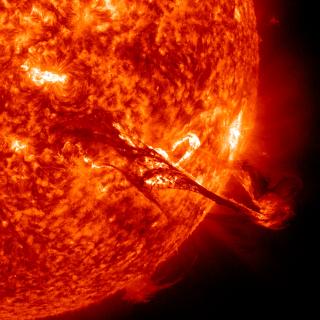Khomenko, E.; Kochukhov, O.
Bibliographical reference
The Astrophysical Journal, Volume 704, Issue 2, pp. 1218-1238 (2009).
Advertised on:
10
2009
Journal
Citations
13
Refereed citations
9
Description
Rapidly oscillating Ap (roAp) stars exhibit an astrophysically
interesting combination of strong, dipolar-like magnetic fields and
high-overtone p-mode pulsations similar to the Sun. Recent time-resolved
spectroscopy of these stars unravelled a complex picture of propagating
magnetoacoustic pulsation waves, with amplitude and phase strongly
changing as a function of atmospheric height. To interpret these
observations and gain a new insight into the atmospheric dynamics of
roAp stars we have carried out two-dimensional time-dependent,
non-linear magnetohydrodynamical simulations of waves for a realistic
atmospheric stratification of a cool Ap star. We explore a grid of
simulations in a wide parameter space, treating oscillations of the
velocity, magnetic field, and thermodynamic quantities in a
self-consistent manner. Our simulations foster a new understanding of
the influence of the atmosphere and the magnetic field on the
propagation and reflection properties of magnetoacoustic waves,
formation of node surfaces, and relative variation of different
quantities. Our simulations reproduce all main features of the observed
pulsational behavior of roAp stars. We show, for the first time, that
the overall depth dependence of the pulsations in roAp atmospheres is
strongly influenced by the density inversion at the photospheric base.
Related projects

Solar and Stellar Magnetism
Magnetic fields are at the base of star formation and stellar structure and evolution. When stars are born, magnetic fields brake the rotation during the collapse of the mollecular cloud. In the end of the life of a star, magnetic fields can play a key role in the form of the strong winds that lead to the last stages of stellar evolution. During
Tobías
Felipe García